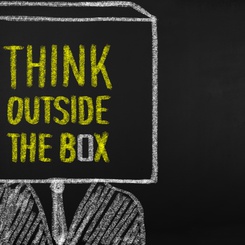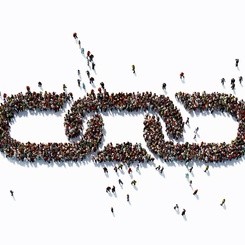Over the course of a few days, the nature of recent debates on work have significantly changed. Are you still thinking about workplace well-being and psychosocial risks in this time of quarantine and social distancing? Organizations are faced with a new crisis, one that is massive and risks being fatal.
Many are no longer able to work, either because of decisions made by the authorities or because supply chains have been disrupted. The collaborative nature of work, namely interactions with colleagues, has been challenged by quarantine and social distancing. In a world of work where all is managed, predicted, and standardized, those who are still working are seeing themselves thrust into the unknown without guidelines on how to act in these unprecedented times.
Disruption has already begun, and the workplace experts of tomorrow will surely be able to identify the important, effective, and sustainable elements of the current turmoil. For the time being, we will turn our attention to three aspects of management: modalities of working, who is working and how to work through and overcome the crisis, and preparing for post-crisis life.
Work modalities
Remote work is no longer reserved for thirty-something parents employed at large organizations in urban areas. The world of work is already being transformed by the crisis and it will be critical to continue examining how we can update our work modalities even after the storm has passed. For those who must, can, and want to continue working, it is important to take another look at our tasks, review our priorities, integrate preventative measures in accomplishing mundane tasks, and reorganize our teams to manage absences. It is very clear that work requires all of us to be responsible, to take initiative, and to persevere to identify how we can best manage our personal work situations: qualities that traditional organizations and contemporary sociology have not necessarily emphasized in the past.
Of course, work also changes because remote work becomes the norm and increasingly an obligation, even for those who have not already tasted its charms. Most people will find that they are able to accomplish more than they could have imagined. This extraordinary situation has already reduced much of the resistance to using technology; our systems must adapt, and identify what will continue to require in-person meetings and what can be done at a distance. This crisis will accelerate the development of new ways of working.
Without a doubt, we will eventually, but not immediately, begin to see what working at a distance does not allow us to do. In crisis situations, urgency prevails, perhaps at the expense of a thorough critical analysis, but we often learn that a lot of standard tasks are not necessarily essential. The crisis may actually be an opportunity to question reporting and control activities that contribute little to the common good. We may also identify helpful aspects of face-to-face interactions: after all, you don’t know what you have until it’s gone.
Individual behavior
Crisis situations call to mind the fundamental principles of human behavior. They also reveal a lot about people: some people will rise to the occasion, whereas others will falter or withdraw. These times shine a spotlight on people’s personal values in a way that we don’t tend to see in normal times.
Times of crisis also bring out the best and worst of humanity: some will continue to provide a service, feeling responsible for doing their part for the good of society, and others will slink away, stocking pasta and stealing masks as they do.
Even more interesting is the way the crisis sheds light on the dynamics of behavior, as seen in diaries of people who have gradually entered crisis situations like war, imprisonment, or sickness. Sometimes we may become irritated with the behavior of others, either due to what we perceive as negligence or excessive caution, but it is important to keep in mind that we don’t know the full story. In reality, how people act in these situations tends to evolve and pass through different stages at their own rhythm.
At the beginning, there is denial: the crisis will not impact us, it’s the problem of other countries, industries, companies, or social classes. Then there is anger and we start to blame scapegoats for the problems we are facing, and to think that those in power are maliciously obfuscating the solutions. Finally, we move into acceptance and adjust our behavior to our new reality, leading us to be inventive and creative. One thing is for sure: information, and more specifically confidence in those who share that information, is a means to accelerate this process. Organizations and managers can thus draw on the confidence that they have nurtured over time.
On a more individual level, Marion Muller-Colard [1] identified three phases we go through when faced with a crisis. The first is complaining and rebelling against the situation, feeling angry at those we see at perpetrators, and feeling a deep sense of injustice that we have to go through such an ordeal. Then there is the feeling that the crisis is threatening all we hold dear and all we used to take for granted. The last stage is acceptance: accepting not only the crisis but acknowledging that it can bring us new joys, discoveries, or sources of hope. It is essential for all individuals and organizations to note how reactions change day-to-day: this will allow us to see the way forward once the crisis has passed.
Resources for the post-crisis period
The transformation of how we work and behave is now shaping the world of tomorrow and the big question is how to best prepare for our new reality. During a crisis in the 20th century, a major automobile brand stated that “when the going gets tough, get back to basics”. We have a better shot at overcoming a crisis if we have more resources and if financial resources are not the only kind at our disposal. Of course, having more resources - not of pasta, but of employee engagement - will be inestimably useful to overcome the crisis. If this is not the case and we played the grasshopper rather than the ant, there are three points that can guide how we manage work.
The first concerns the purpose of the organization in the most basic sense, namely what it is supposed to deliver. An organization survives by delivering something of use to the outside world and does not solely exist for its employees and shareholders, but to contribute to the common good. Remembering this purpose and responsibility to the world is invaluable in these times.
The second point is about strengthening links between people, even if done at a distance. Solid relationships are like health in that we don’t know what we have until it's gone. Nurturing relationships is no longer done by playing foosball and going for happy hour drinks, but there are innumerable ways to continue to strengthen those bonds after a week of quarantine. It’s an opportunity to be creative and, perhaps more challengingly, to persevere.
The third point refers to our approach to our management in our new reality. In the throes of a crisis, what seemed indispensable a week ago now seems mundane. While there are a multitude of analysts, lecturers, and experts of tomorrow chiming in on how to behave during the crisis, it is of the utmost importance to recognize our personal and collective fragility, to recognize the necessity of working together, and to avoid judging our future selves too harshly as it is hard to say how we will react over the course of the crisis and when it comes time to build a post-crisis reality.
References
1. Muller-Colard, M. L’Autre Dieu : la plainte, la menace et la grâce. Albin-Michel, 2017.
Further reading
Thévenet, M. Manager en temps de crise. Eyrolles, 2008.









